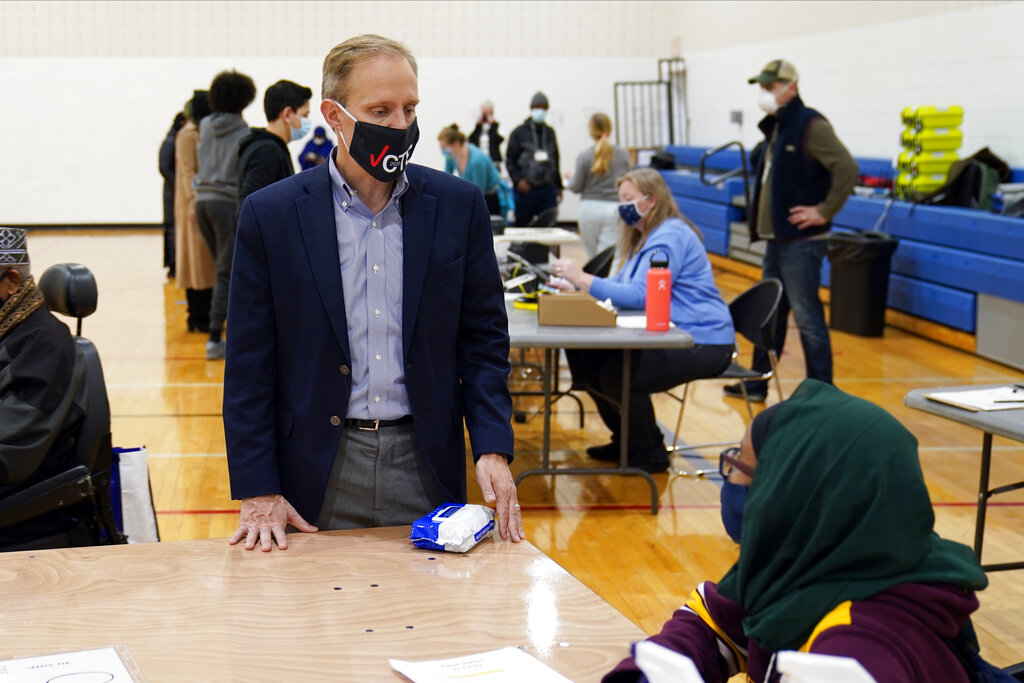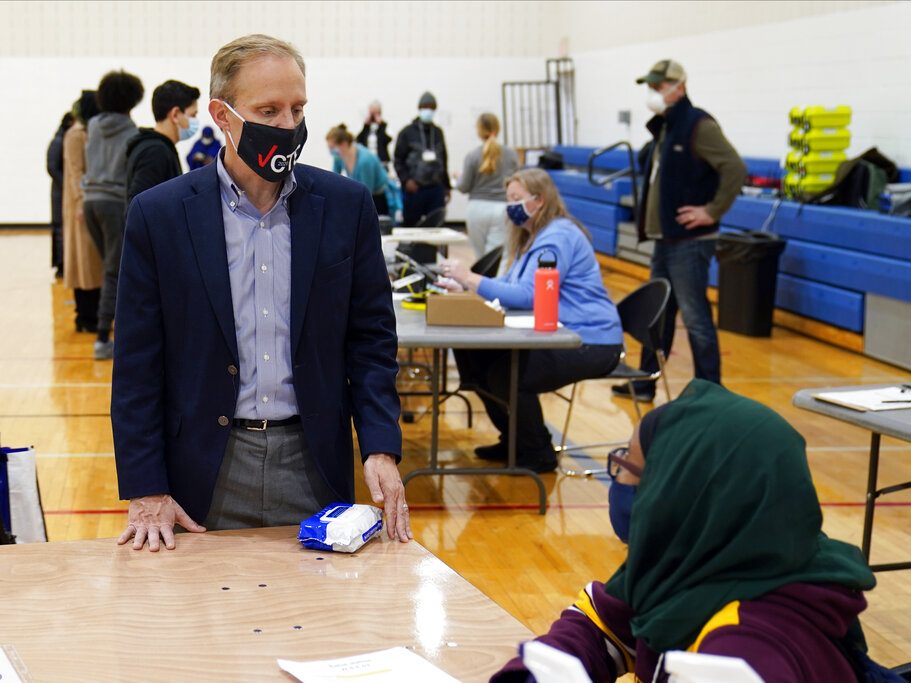
Minnesota Secretary of State Steve Simon visits with poll workers as he toured the Brian Coyle Center, Election Day Tuesday, Nov. 3, 2020, in Minneapolis. (AP Photo/Jim Mone)
MINNEAPOLIS (AP) — Joe Biden carried Minnesota on Tuesday, dashing president Donald Trump’s hopes of becoming the first Republican to carry the state since Richard Nixon in 1972, as polling generally went smoothly across the state.
Democratic U.S. Sen. Tina Smith was in a tough fight to keep her seat against challenger Jason Lewis, and three of the state’s eight House seats were seen as close. Also on the ballot: the potential for Democrats to capture full control of state government by taking the Senate.
A record number of Minnesotans voted early to avoid potential long lines on Election Day and the threat of the coronavirus. The state told voters it would count absentee ballots that came in up to one week beyond Election Day as long as they were postmarked by Tuesday. But a court ruling last week requiring that those ballots be segregated cast doubt on whether late-arriving votes would count.
At midday Tuesday, the state reported that some 283,000 requested absentee ballots hadn’t yet been returned.
A look at races in play in Minnesota:
President
Joe Biden captured Minnesota despite a strong push from President Donald Trump. Trump nearly took Minnesota four years ago and talked repeatedly about doing it this year. That would have made him the first Republican to do so since Richard Nixon in 1972. Trump held several rallies in the state, mostly in rural and northern Minnesota where his following was strongest. Biden got a late start but benefited from a passionate Democratic turnout in the state’s liberal metro area. Two dueling visits by both candidates on the same days in the final weeks highlighted Minnesota’s battleground status.
Senate
Democratic U.S. Sen. Tina Smith faced voters for the second time in as many years after winning a special election in 2018 to fill out the term of U.S. Sen. Al Franken. She worked to build an image as a workhorse who reaches across party lines.
Republicans put up former U.S. Rep. Jason Lewis, who was well known from his days as a conservative talk radio host and a single term in the House. He stressed his support for Trump, including their shared opposition to pandemic restrictions and a common message that they would be better for “law and order” than Democrats. Trump rewarded Lewis’ loyalty with public praise.
House
Democratic U.S. Rep. Collin Peterson, a national figure as chairman of the House Agriculture Committee, asked voters in western Minnesota’s 7th District to send him back to Washington for a 16th term. He faced his most serious challenge in decades, from Republican former state Sen. Michelle Fischbach, in one of the GOP’s best pickup opportunities across the country.
There’s also a close race in southern Minnesota’s 1st District, where freshman GOP Rep. Jim Hagedorn is trying to fight off Democratic Iraq war vet Dan Feehan in a bitter rematch of their close 2018 race. And Minnesota’s 2nd District race, for the seat representing southern suburbs, was scrambled by the death of a third-party candidate. Democratic Rep. Angie Craig went to court to block having the election delayed until February, which might have put her at a turnout disadvantage against Republican and former Marine Tyler Kistner.
Democratic U.S. Rep. Ilhan Omar, a favorite target of Trump’s ire, easily defeated well-funded GOP challenger Lacy Johnson in the district that includes Minneapolis, while Democratic Rep. Dean Phillips defeated Republican Kendall Qualls in a western suburban district. GOP Rep. Tom Emmer beat Tawnja Zahradka to win a fourth term in a district that stretches from the northern and western suburbs to past St. Cloud.
Legislature
All 201 legislative seats are up for election this year, and the GOP is defending a three-vote majority in the Senate. If Democrats take the Senate and keep their comfortable House majority, they’ll control how Minnesota deals with a projected $4.7 billion budget deficit and the redrawing of state and congressional district maps. The redistricting stakes are high. Minnesota is on the bubble for losing a congressional seat after new census figures come out.
Supreme court
Associate Justice Paul Thissen, a former speaker of the Minnesota House, is facing voters for the first time since his appointment in 2018. Challenging him is Michelle MacDonald, a controversial family law attorney who is making her fourth bid for a seat on a court and is facing potential disciplinary sanctions for a second time.
Voter voices
Marty Boeckman, 57, a software engineer from the Minneapolis suburb of Blaine who described himself as “very conservative,” said Tuesday that he voted for Biden “based on integrity. Integrity is what’s driving it all.” Trump, Boeckman said, ”is just not what I want from a leader.” He said Biden is better equipped to deal with the pandemic.
“Trump’s in denial. … There needs to be a middle-ground approach” between doing nothing and complete lockdowns, he said.
At the same Blaine polling place, 45-year-old Greg Janacek said he voted for Trump.
“The biggest issue for me would be law and order,” Janacek said. “And keeping the economy strong.” He said he was concerned about law and order because of unrest and other events that followed the death of George Floyd in Minneapolis, “and the ones that could unfold.” He also said he thought Trump would be more able to deal with the pandemic going forward.
“I think it’s a good balance of staying open but still protecting our citizens,” he said.

